So, the official part of Day 1 is over. I’ve spent most of the day listening to the various lectures of the Social and Online Games Summit. Roughly half of them have been very good and interesting, the other half was so-so.
Indies and Publishers: Fixing a System That Never Worked
I actually spent the first 20 minutes or so in this Indie Games Summit lecture. Ron Carmel of 2d Boy (World of Goo) was speaking and since I was so fascinated of his opening talk last year, I decided to give this one a try.
Unfortunately the talk didn’t do anything for me. Ron simply presented the traditional publishing model and contrasted it with indie development. Then to fix the problems of Indie Development (lack of funding) he presented the recently announced Indie Fund.
While I love the idea and concept of the Indie Fund, the lecture just seemed like an ad for the fund, which was a sort of turn off for me. I got up and left during the Q&A session.
How Friends Change Everything
I then went over to this keynote lecture by Gareth Davis of Facebook who talked about the platform and it’s relevance for gaming. Even though I missed the first half of it I still enjoyed it. Unfortunately I have made no notes but I’m sure it’ll be well covered by the blogosphere. Either way, the lecture was interesting, even if far from groundbreaking. Still nice to get a look behind the scenes at the monolith that is Facebook.
What Virtual Worlds Can Learn From Social Games
Next up was this lecture. The first one actually held by designer: Sulka Haro of Sulake, the makers of Habbo Hotel.
There were some interesting tidbits there, such as using the six different playstyles as defined by Mildred Parten to look at Social Games. This makes it clear that Social Games as we currently know them are mostly about the parallel play. People can’t really play with each other, instead they play “next to each other”.
Another thing was that the speed and responsiveness of an application can have a tremendous impact on retention and conversion rates. Habbo started out as a Shockwave plugin that was eventually moved to Flash for the much larger install base (98% vs 40%). This also sped up the performance of the app and led to +7% retention rate and +5% user conversion. Somewhat surprising that this has such an impact.
Sulka also talked about the advantages of the Facebook platform. An obvious one that nevertheless never crossed my mind is that there is no risk to lose users to forgotten user/pass data. How often do you just create an account out of impulse and then you forget which login data you used? Propably happens more often to your potential users than you’d think.
The last thing I want to point out was a little bit about the “placeness” of social games: In many games it doesn’t seem to be necessary. FarmVille has a game space but it’s not really used by the game. All that happens is the avatar walking around – and even that is best prevented by the players. There isn’t really a lot of justification to have such a game space. I kinda liked that statement because I am pretty much of the same opinion.
Why Are Gaming Veterans Flocking To Social Gaming
This roundtable was moderated by Noah Falstein (The Inspiracy) with Brian Reynolds, Brenda Brathwaite and Steve Meretzky speaking.
The four were talking on the topic and it was interesting to listen to them talk. All of them were attracted to the Social Game space by shorter development cycles, smaller teams and a sort of “pioneer spirit” as I’d call it.
Aside from that it was a great panel but not really something where I took a lot of notes. The only point I did write down was the argument about complexity: Will Social Games become more complex?
What was interesting about the answers was that there was a solid 50/50 divide. Two interesting arguments in this old debate that I want to repeat were: To keep gamers interested the game has to produce new content, sometimes in the form of new game mechanics. This layering will undoubtedly make games more complex. The other side of this is that the more complex these games get, the harder it is for them to lure new players in since there’s too much stuff to know and handle.
What Social Games Can Learn From Virtual Worlds
This lecture was held by Michael Goslin of Hangout Industries and definitely one of my favorites of the day. The talk was focused on the two key things that VWs/MMOs do better than Social Games: User retention and monetization.
According to Michael, retention is based on the following factors:
- Player investment in the world
- Deep content
- Fresh content
- Service
- Concurrency (People playing simultaneously)
- Community
He then elaborated on these points. I don’t have notes on this but I’ve taken pictures of each of these slides. I hope most of it is self explanatory:
Succeeding with Licensed Brands in MMOs and Virtual Worlds
This was the last talk of the day. Another roundtable, this time led by N’Gai Croal. Four licensors/licensees talked about their experiences with developing a licensed game.
The panel was alright, although a little generic at times. The key ideas though were: The approval process of the Licensor is generally in contrast with the need for constant, timely updates to keep the game fresh.
MMOs are services and monetized over a longer period of time. To have paying users, you need to retain them, which requires a quality experience. This is often at odds with the fixed deadlines as they are common in IP-based game development: Movie Games need to be finished and released by the time the movie hits the theaters.
So that was it for my first day. I’ll hopefully tell you all more tomorrow.

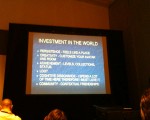
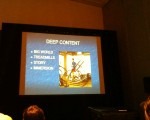
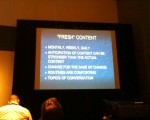
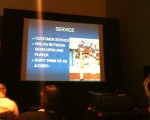
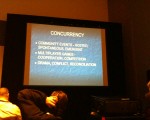
Great notes, a few thoughts:
“Play next to each other” is the killer point of social gaming. Any social game designer should have that etched on their foreheads.
Should social games become more complex? I have two thoughts on this:
(1) it is possible to give games “depth” while having extremely simple mechanics. You can explain every “feature” of drafts or dominoes in a few minutes, but these games have tremendous depth.
(2) I like the idea of experienced players unlocking new “mechanics” — not just new objects that have different “stats”, but that fundamentally change game behavior. Is anybody doing that yet?
And one more thing — game space in Farmville is important as a means of expression through the game. People design their farms, often quite carefully. The layout of a farm is ignored by the game mechanic, but not by players who look at each others farms for entertainment.
It might even be that good looking farms do better because they bring in more visitors, who can then “help”. I like the idea of social games where the players produce some kind of “expressive artifact” as a consequence of the game.
I’m not sure social games NEED TO HAVE parallel play. I just think it’s the current norm because it’s easy to design and easy to build. However I can see the next generation of games keeping the simple mechanics but using a cooperative gameplay style. Because the target audience still understand the mechanics easily enough to get hooked and they’re (hopefully) familiar with social interaction, which shouldn’t really raise the bar of entry. I myself am curious as how this goes.
1) Yeah. Simple rules, deep gameplay. That’s definitely a good way BUT if you look at games using that set of mechanics – let’s say go or chess as examples from the board game world – you’ll notice that they only create depth because you play against another person. Their act of playing is what makes these games so great, which kind of goes back to the point I made above.
2) Just what I was thinking. Coming from developing the Wii and DS Anno: Create a New World game, that’s just what we did there. It’s common for tutorials in retail games and will eventually find it’s way into social games, but I don’t know if we’re there yet.
Well I totally agree. The visual representation of a space is what creates a large part of the attraction and some of it’s gameplay for the users. BUT I might have to elaborate what I mean when I say “game space”:
If you hadn’t noticed from the name of the blog, I come from an architecture background and wrote my diploma thesis on digital game spaces. My own definition of spaces is that you only experience space as something different from – say a photograph of a space – when you MOVE within it. When there’s interaction. That’s where the image of space becomes space. And Farmville does very very very little of that.
Also yeah: Players creatively generating stuff is awesome because A) It increases retention of these users B) it generates stories that players can talk about and C) produces marketing material.
If you forget that chess is a head to head game, where both players are trying to achieve the same thing, and just focus on one player’s experience — what makes it deep?
I think it’s that the “game” responds to your choices in a way that is both unpredictable and (usually) logical. When you play a move in chess, you don’t know exactly what will happen next. But you try to guess — and guess ahead quite a long way. And that the small action you take with one piece can affect the whole board.
Playing against an intelligent opponent is only one way of having a player’s actions have unpredictable and far reaching, but logical, consequences. It can be built into the logic of a single player game too.
Of course it could, but if we’re trying to build social games, they’d just suit themselves so well to having players fulfill that role. After all they’re readily available…